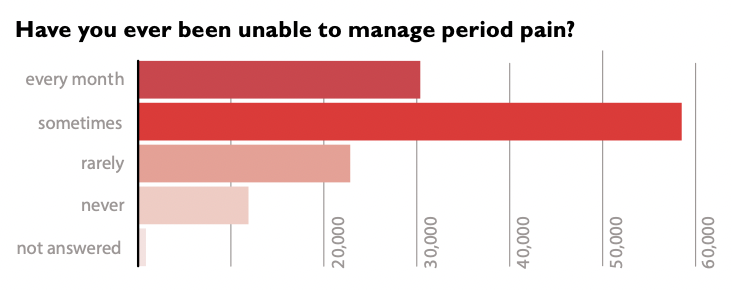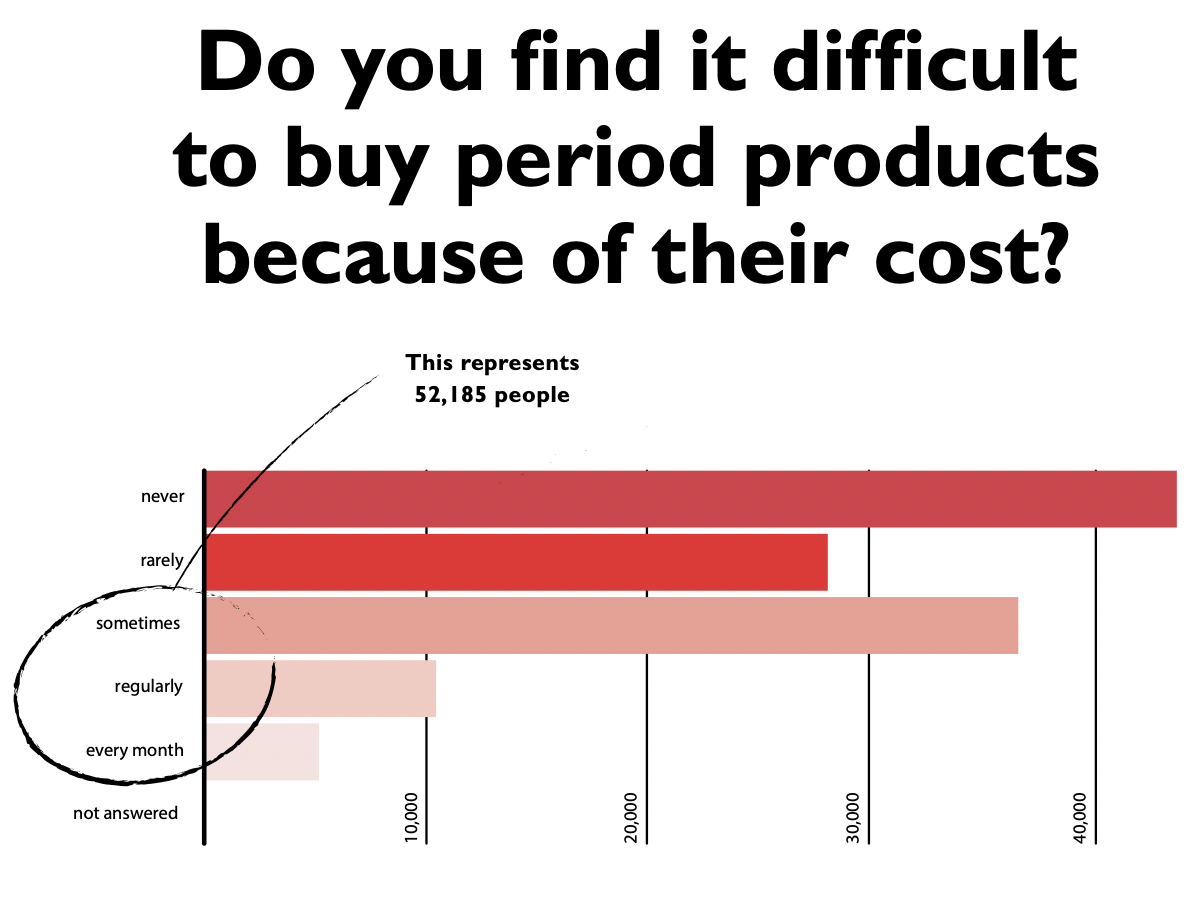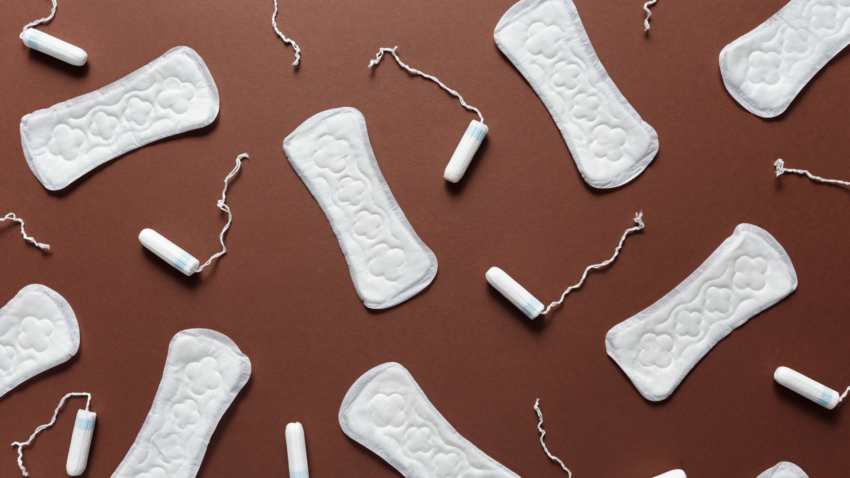More than one in five Australians are resorting to using rags, socks and other unsuitable alternatives for their period because they can’t afford sanitary products.
A fourteen-year-old girl wanders into an empty laundromat looking for socks that have been left behind, forgotten and discarded. She collects whatever she can find, reaching inside the large silver washing machines that smell like old detergent and cotton. Imagine your daughter stealing socks from a laundromat to use for her period. This is the reality for young girls living under the poverty line in Australia.
Rochelle Courtenay, founder of Share the Dignity a non-for-profit national period poverty charity, is teary eyed as she recounts a tragic but sadly common story. “Somebody else’s socks in your underpants to deal with your period,” Courtenay says, “I would never wish that for anybody. So that’s what I do what I do.”

“No one likes to talk about poverty because it’s a dirty secret,” Courtenay says, “and no one likes to talk about periods because it’s something that doesn’t really happen, right?” When you mix the two together you are creating an almost untouchable subject. Alarm bells ring when a young girl is telling you she is safer on the streets than in her home. Forced to use unsanitary alternatives for her period that are potentially dangerous for her health. Women in poverty are expected to deal with it when toilet paper is free but essential period products aren’t.
The Period Pride Report: Bloody Big Survey by Share the Dignity found that “close to half of the 125,000 respondents said they had missed at least one day of school because of their period.” It also reported that around 50% of participants “also admitted to wearing a pad or tampon for more than four hours because they didn’t have enough products to get by.”

A report in 2020 found that over 3.24 million Australians are currently living below the poverty line. This leads to period poverty where Australians cannot afford period products on top of other essentials. Dr Ruth Knight from The Australian Centre for Philanthropy and Nonprofit Studies based at QUT Business said in an interview with Women’s Agenda that “period poverty is a real issue that is under-researched.” Saying that “we have anecdotal evidence of teachers personally donating products but there is a lack of data about the level of need.”
“Period poverty is a real issue that is under-researched.”
Over the past 5 years there have been a handful of positive changes. New Zealand has made period products free for all school students across the country, ahead of Australia. While Scotland has become the first country in the world to provide free period products for anyone who needs them, not just school or university students. This is a milestone that needs to happen all around the world, as period poverty doesn’t just stop once females finish school.
At the start of 2021 South Australia announced that free period products will be available in every public school over the next 3 years. With the state government spending $450,000 to provide students in year 5 and above with products. Victoria also has free products for school students and New South Wales has followed suit saying they will provide free products in public schools. Courtenay points out that roughly 200,000 products only supply 50,000 females over 4 months and to only have $450,000 for all schools in one state is not enough.

Share the Dignity started with a single Facebook page; it now has nearly 60,000 followers on Instagram, a partnership with Woolworths and nearly 250,000 followers on Facebook. Without social media, charities like this would not exist and there would not be a space for these conversations to happen. Courtenay maintains that no one in the government wants to talk about homelessness or domestic violence because it’s not positive. “All of the things that are relative to women are things that we don’t want to discuss,” she says.
When we think about period poverty we often naively associate it with homeless people. But in reality, people living in poverty could be your colleague or classmate sitting right next to you; poverty doesn’t always look like what you think. The issue with period poverty is the lack of data, as governments and politicians alike use data to make changes; without data they won’t fix the problem. Share the Dignity is trying to change this, with their national period pride survey aiming to collect data that can be presented to the government.

Let’s Talk, Period. is an audio podcast hosted by Isabella Gosling that’s dedicated to opening up the conversation around female health and anyone who menstruates. Isabella says “periods are the only blood that doesn’t come from violence or injury. It’s a natural occurrence… yet it’s seen as dirty.” Breaking down the stigma through social media and the podcast, a digital platform that can be accessed anywhere around the world, is a great step that starts to abolish the notion of shame.
“Periods are the only blood that doesn’t come from violence or injury. It’s a natural occurrence… yet it’s seen as dirty.”
Gosling says that the team decided to create an audio podcast instead of video content because you can just pop your headphones in, and no one will know what you’re listening to. “If you don’t want people to know what you’re listening to… there’s nothing on your screen,” she says. “It’s just a really great way to create conversations (without) that notion of shame or judgement.”
Social media creates an online community for period poverty, where the conversation happens on Twitter, Facebook and Instagram. Here users are quick to point out that the government is acknowledging period poverty by awarding Young Australian of the Year to Isabell Marshall, who co-founded a not-for-profit sanitary products company. But they are still yet to take on the responsibility of constantly collecting the relevant data to make political changes.
One Twitter user responded to the announcement that period products are now free in schools across New Zealand by saying, “Meanwhile here in Australia, we have a federal government who gives out an Australian of the Year award to young women for running a similar program rather than actually taking responsibility for helping women/reducing period poverty themselves… #auspol” Which suggests that the Australian government knows period poverty exists but are choosing to put it on the back bench.

Period poverty and domestic violence often collide, as many women fleeing domestic violence don’t think to grab their period products when they are escaping from a situation. In Australia one woman dies every week as a result of domestic violence and their names go unheard.
“A woman dies every freaking week by someone that once said they loved her… we have continued to not do something about it from the government perspective and yet a man gets killed by a shark, once or twice a year… It will be in the media for 3 freaking days, everyone will be talking about it… they’ll be putting alerts on every shark that’s out there.”
Courtenay said “a woman dies every freaking week by someone that once said they loved her… we have continued to not do something about it from the government perspective and yet a man gets killed by a shark, once or twice a year, it is complete up-brawl. It will be in the media for 3 freaking days, everyone will be talking about it… they’ll be putting alerts on every shark that’s out there.” How can so much time and coverage go into one man being killed by a shark every once in a while, yet we can’t even protect women in their own homes.
In Australia period poverty is slowly turning heads and being recognised as an issue. But there is so much more that needs to be done; we need data, we need funding and the government needs to do more. Having free period products in schools is great, but what about university students and those that aren’t students living under the poverty line.
If you or anyone you know needs more information on domestic violence call 1800-RESPECT or Lifeline 13 11 14
How can you help?
There are many ways to support period poverty in schools and beyond, here are some foundations where you can donate your time or resources.







